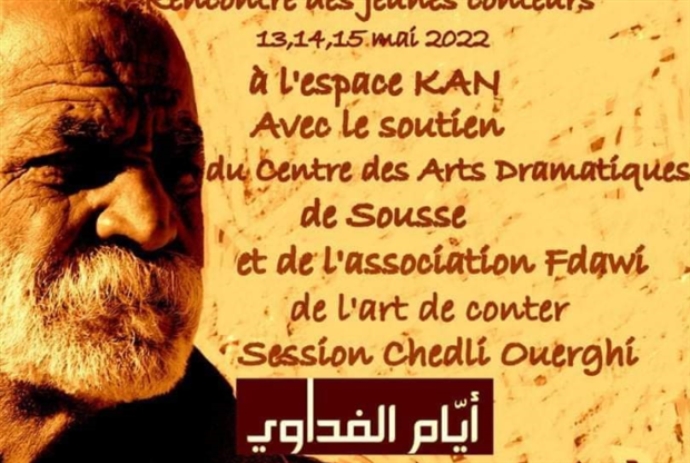The program includes a series of presentations including “The Story of Bar Bin Maqam” by the “Mohamed Al-Zerqati Association” in Sousse and an exhibition by plastic artist Karima El Hanachi entitled “The Fabric of Memory”, as addition to presentations. storytelling laboratories at Sousse Public Libraries and performances of Mandara by Yassin Ben Ali and Tales of the Grandfathers by Taher Ezzedine, Al-Hajai Said by Imad Al-Waslaty, Bossa Khal by Hoda bin Omar, and a group governorates of a performance in the countryside called “Al-Fadawi (Hakawati) Mobile”, and an interactive laboratory at the Sousse Museum called “Time and place in folklore”, as well as a symposium dedicated to the late Abdel Rahman Ayub, one of the pioneers of teaching biography of folklore at the University of Tunis and specializing in the sociology of folklore and seminal biography, in the presence of a number of his students and colleagues, as well as the testimony of Arab researchers through the Zoom application, in addition to an interactive laboratory on the art of storytelling, framing theatrical productions by Kamal Al-Alawi, Wahid Al-Daridi and Imad Oueslaty and others, as well as lectures by Moroccan Idriss Kesri on the Al-Halaka theater experience in Morocco.
The art of storytelling, known in Tunisia as ‘Al-Fiddawy’, in Morocco as ‘Al-Kawwal’ and in the Arab East as ‘Al-Hakawati’, has gained its audience in Tunisia over the past twenty years since its creation the this festival that stands behind the publication of the taste of this theater, regarded by some theater historians as an Arab, is the womb in which the Arab theater experience was born before the opening of the Italian lodge.
This festival has resulted in other celebrations in Tunisian towns and villages dedicated to the art of storytelling in relation to the approach to children and youth to restore the traditions of folk tales, especially in the space of public libraries. .
Ayam Al-Hakawati remembers Al-Sira Al-Hilal, the pioneer of research.

Yesterday marked the end of the twentieth session of the “Days of al-Fadawi” (Hakawati) in the pearl of the Tunisian coast, the city of Sousse, as Tunisians call it. This event is primarily based on the art of storytelling and is the first special event in this field organized in Tunisia, initiated by the Association of Librarians and Writers in Sousse. Representatives from Tunisia, Egypt, Morocco, Italy, France, Algeria and Palestine participated in this edition.
- Advertisement -